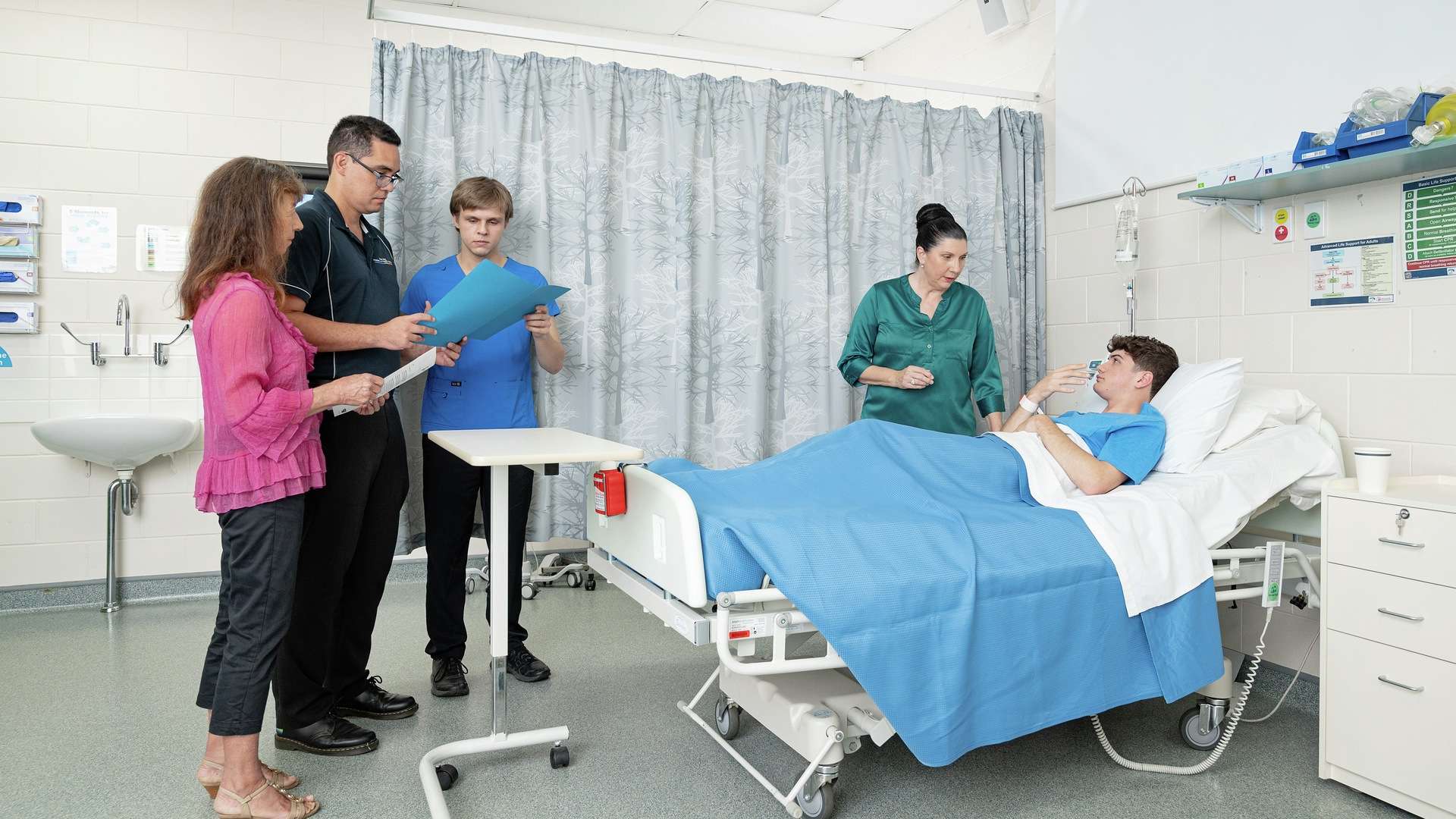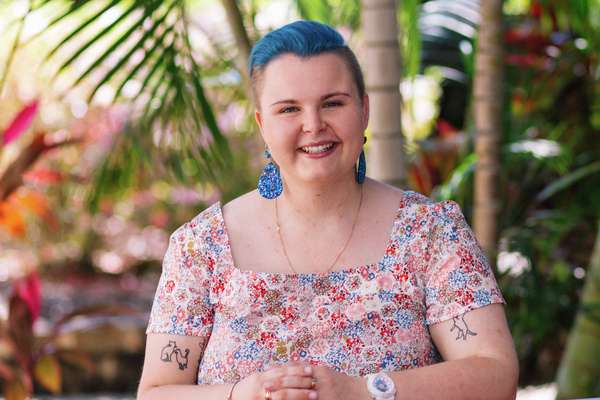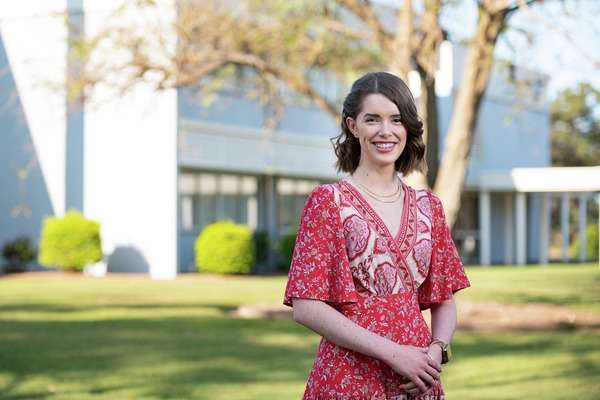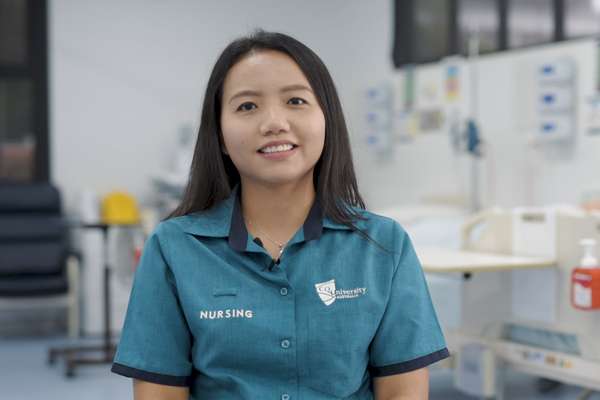School of Nursing, Midwifery and Social Sciences

Our courses are available on-campus, online, and in mixed mode, with hyper-flexible postgraduate options through the Be Different platform—self-paced, assessment-free, and accessible anytime.
The School comprises two Colleges:
We are leaders in Nursing and Social Work education, with a strong focus on student learning and research-informed teaching.
Work Integrated Learning (WIL)
Many of our courses include work placements, coordinated by our WIL Team. We ensure quality placements in healthcare organisations across Australia, guiding students through pre-placement requirements.
Our Philosophy
The School of Nursing, Midwifery and Social Sciences is committed to delivering high-quality education and research, with a focus on regional, rural, and remote communities. Our flexible learning options—including mixed-mode and hyper-flexible delivery—allow students to study within their own communities, gaining professional experience placements close to home.
We support diverse student groups, including first-in-family, low socio-economic, and minority backgrounds, helping them access life-changing education. Our courses are designed to engage with and strengthen local communities, providing pathways from VET certificates to PhDs.
Our research drives improvements in healthcare quality, workforce development, and community wellbeing. We collaborate with industry and mentor emerging researchers, fostering excellence and expanding networks.
We look forward to welcoming you to the School.

Professor Moira Williamson, Dean, School of Nursing, Midwifery and Social Sciences
Real-World Learning and Connections
Gain hands-on experience through community partnerships, clinical placements, and global study opportunities.
The School of Nursing and Midwifery actively engages with industry partners and communities to deliver innovative, high-quality education. Our campuses in Mackay, Rockhampton and Bundaberg foster local, national, and international connections, ensuring our courses meet industry and student needs.
Our aim in Community Engagement is to:
- Promote engagement strategies and activities that are relevant, innovative, and value-adding
- Provide and promote what we do to potential students, existing students, staff and community partners
- Provide a mechanism for discussion and opportunities around engagement
- Disseminate what we do through 'Innovate' our school of nursing and midwifery magazine.
Some of our key activities include:
- Building on collaborative relationships with industry partners
- International nurses day
- International nursing placements in Nepal
- Engagement activities in Simulation including Mask Ed TM (KRS Simulation).
Clinical placement is the period of learning where you get to practice in ‘real’ health care settings and with ‘real’ patients. As you can appreciate there are many policies and rules surrounding clinical placements and it is up to you to learn, understand and follow the set guidelines.
You will be required to attend placement, on the dates that have been provided to you. You will be rostered to different shifts, depending on your course. A facilitator or preceptor will complete an assessment on your skills during the placement.
Before you can attend a clinical placement you need to complete a list of mandatory checks. You will be unable to complete a clinical placement without first meeting these requirements.
It is best to start gathering this evidence early, as some requirements such as immunisations can take a while to complete.
You may like to view the Work-Integrated Learning Policy and Procedure for further information.
CQUGlobal outbound nursing short-term and study tour programs
The School of Nursing, Midwifery and Social Sciences participates in the New Colombo Plan Mobility Program for Nursing Students in Singapore, Nepal and India. The purpose of these programs is to allow students to undertake an international clinical experience which provides them with the opportunity to experience different cultural and social environments and clinical settings and prepare them to work in an increasingly global community.
Why participate?
- Learn to see the world differently
- Develop key employability skills
- Expand your global network
- Engage with legitimate experiences
- Receive CQUniversity student insurance cover
- Access funding and scholarships
Where to go and what to do?
There are a variety of short-term overseas experiences: CQUGlobal nursing program supports 50 opportunities across 3 countries, allowing you the flexibility to choose an experience that suits your personal needs and goals between.
The outbound short term program offered by the School to undergraduate students provides a wonderful opportunity to enhance and diversify your learning experience. CQUniversity Nursing and Midwifery students have been involved in outbound programs to places such as Nepal, Japan, Singapore and Palau over the past years. These trips are an amazing experience for nursing students, and they have a tremendous impact on the communities who benefit from our student’s fundraising and clinical treatments. It is this kind of activity that is making CQUniversity one of Australia’s truly great universities.
Developed in conjunction with internationally renowned organizations, the program is designed to help you develop a global perspective by gaining an appreciation of cultural diversity through immersion in academic and clinical experiences.
Costs
There are a variety of costs involved in a short-term global experience. These costs differ enormously depending on the specific program you apply for, and the region of the world that program is located in. It is important that you research thoroughly the costs involved in the programs you would like to participate in. You can do this by visiting CQUniversity's CQUGlobal Outbound website. It is your responsibility to research and understand the full financial and academic implications of participating in any short-term global experience.
For enquiries relating to international nursing opportunities, contact our School International Officer or for general information visit our CQUGlobal Outbound page.
Our Course Options
We provide high-quality education across VET and Higher Education, ensuring a rewarding and successful study experience. Our evidence-based curriculum reflects contemporary healthcare needs, combining theory with hands-on experience through Work Integrated Learning (WIL).
Our courses are designed for flexibility, supporting students across all study modes. Research-driven teaching ensures graduates are equipped for global healthcare environments, with opportunities for international study experiences.
We offer a full education pathway, from certificates to postgraduate qualifications, alongside short courses and professional development options, including CPD-accredited modules for AHPRA registration.
Nursing
Get qualified for a career as an enrolled or registered nurse with our practical, industry-aligned TAFE and undergraduate nursing courses.
Midwifery
Enjoy a rewarding career looking after women during pregnancy, labour and the postnatal period as a qualified midwife.
Social Work
If you’re interested in social justice, human rights, and changing lives for the better, then a course in Social Work is ideal for you
Nursing Re-Entry
Designed for nurses whose registration has lapsed, our Graduate Certificate in Nursing (Re-Entry) will equip you to return to work as an RN.
Mental Health Nursing
Gain foundational knowledge or qualify yourself as a specialist nurse with a postgraduate degree in Mental Health Nursing.
Correctional Nursing
Gain the skills and expertise to work in the unique, complex world of correctional facilities with a qualification in Correctional Nursing.
Clinical Nursing
Enhance your employability and advance your nursing career with a postgraduate degree in Clinical Nursing.
Gerontology
Advance your understanding, skills and capabilities in responding to a diverse ageing population with a specialist postgrad nursing degree.
 “
“The way it's delivered is so engaging. You feel like you're actually working with real people, even though it's simulation. I don't know any other professors that dress up in silicone suits and let you poke and prod them!
Rhiana Jackson
Bachelor of Nursing, Master of Mental Health Nursing
 “
“I love that there are so many aspects to nursing and different career paths that you can go down. I chose this course as I've always been interested in nursing and health. I also love to help people, of course, that is one of the main reasons that I chose it.
Eva McGrail
Bachelor of Nursing
 “
“One of the best things about my course is the opportunity to do placements. The nursing staff are accommodating and the patients are willing to be involved. I want to continue on this journey and be part of the nursing workforce in this country.
Ivy Vana
Bachelor of Nursing | Philippines
Research in the School of Nursing, Midwifery and Social Sciences
The School of Nursing, Midwifery and Social Sciences (SNMSS) research activities are overseen by the Deputy Dean (Research), Associate Professor Tracy Flenady. Tracy is supported in this role by the Postgraduate Research Coordinator for SNMSS, Dr Amy-Louise Byrne.
Research in the SNMSS involves researchers from a range of discipline areas, creating a comprehensive and multi-disciplinary approach. The research areas have a strong focus on applied research with direct benefit to regional and rural Australia, while also being of national and international significance.
The SNMSS deliver discipline expertise in Nursing, Midwifery and Social Work, offering undergraduate and postgraduate degrees in all three of these specialty areas. The Queensland Centre for Domestic and Family Violence Research (QCDFVR) sits within the SNMSS and contributes to the prevention of domestic and family violence by informing, promoting and supporting the actions of individuals, communities, services and governments through state-wide leadership in research, professional development, education and community engagement.
The SNMSS aspires to achieve research rankings of world standard or above in each of these four specialty areas; Nursing, Midwifery, Social Work and Human Society (QCFDVR). To achieve this goal, each Focus Area is overseen by a Research Discipline Lead, whose main objective is to work with the School's research leadership team to plan and discuss the strategies required to develop programs of research around each Focus Area and then oversee the implementation of these
Led by Dr Amy-Louise Byrne and Associate Professor Pauline Calleja
This priority area comprises research focused on enhancing and advancing the profession of nursing, aiming to progress the global voice of nursing. This research focus area positions nurses and the nursing profession as leaders of healthcare reform and change, recognising the importance of social and cultural areas of care. Recognising the importance of collaboration and teamwork, our research takes a multidisciplinary, and whole of systems approach.
Research in this priority area encompasses a broad range of nursing foci and predominantly concentrates on applied research across diverse areas, including but not limited to theory, clinical practice, education, patient safety, quality improvement, cultural safety, and workforce development. Studies investigating the perspectives of health systems, health care providers, service users, and caregivers are also included. Research conducted within this focus area strives to create knowledge that provides solutions to real-world healthcare problems, therefore contributing positive impact for those people who live and work within our communities.
Led by Bridget Ferguson and Associate Professor Adele Baldwin
This priority area is dedicated to research aimed at advancing the field of midwifery to improve the well-being of mothers, babies, and the midwives who provide care. Our research within this focus area positions midwifery as a cornerstone of maternal and neonatal healthcare and champions of human rights. We aim to highlight how high-quality midwifery practice positively impacts health throughout the life course, from cradle to grave, and contributes to the long-term well-being of families, communities, and society at large.
Recognising the central role of midwifery and the importance of both individual agency and multidisciplinary collaboration, our research takes a midwifery-centric perspective while exploring cross-discipline approaches. Within this priority area, our research covers a broad spectrum of midwifery topics across both national and international contexts. It primarily focuses on research throughout various domains, including health systems management, clinical practice, education and professional development, patient safety and quality improvement, and cultural competence.
Our research in this area aims to generate knowledge that effectively solves real-world healthcare challenges. We support the full scope of high-quality midwifery practice and women's rights, ultimately positively impacting the lives of individuals living and working in our communities.
Led by Dr Helen Hickson
The Social Work research focus area includes three clusters: clinical social work practice, counselling, wellbeing and community services and social program evaluation. The social work team is focussed on research that informs social work education and practice.
Our research is centred around engagement and collaboration with community organisations to address social inequity. We are working with community organisations on programs such as community safety and wellbeing, domestic and family violence, and rural workforce planning and sustainability. We integrate social work practice with teaching pedagogy to incorporate student learning experiences such as field education and residential school with real life problems to solve.
Led by Dr Lyndal Sleep
We are social beings, and social experiences, institutions, community, meanings and inequalities permeate all that we do now as well imaginaries for action and change into the future. Central Queensland School of NMSS is uniquely placed to work with communities across Queensland to amplify regional voices and work with all Queenslanders towards a future where all Queenslanders needs are met. Social science methods and concepts are key to this goal, and the social science discipline is vibrant, expert and expanding in SNMSS.
The Queensland Centre for Domestic and Family Violence Research, a flagship in the discipline area, has been a leader in research on women and children’s safety since its launch in 2003. Funded by the Queensland Government and CQU, the Centre continues to work with Domestic and Family Violence service providers including survivor advocates in ground-breaking community embedded research as well as national and international interinstitutional collaborations with impact and is making real change to the lives of Queenslanders, and beyond.
